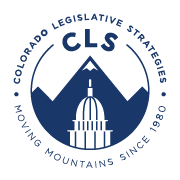A report from the team at Colorado Legislative Services
The General Assembly finished the 2020 Special Session today. In general, the three-day session stayed the course of the preview that legislative leadership announced last week. The Democrats in charge ran a tight ship and did not stray far from the bills that had been carefully negotiated prior to the beginning of the session. In the end, there was bipartisan support for most of the bills and Democrats plus Governor Polis got what they wanted out of this special session.
The special session started out with 33 bills introduced and 10 bills will be sent to Governor Polis to become law. Only one bill with a Democratic sponsor did not pass, and that was after much debate about whether a bill about occupational therapists would fit under the call of the special session. The remaining ten bills that passed represent targeted stimulus for businesses, education providers and families to try to help weather the storm of this pandemic.
Bills without bipartisan sponsors did not pass, but that didn’t stop the Republicans from introducing nearly two dozen bills to try to deliver their message. Republicans also offered multiple amendments in committee and on the floor as well but most failed. These included amendments to clarify that religious organizations were eligible for aid in the food pantry bill (HB20B-1003) and a strong effort by Republicans in the Senate to clarify agricultural events qualified for additional state support in the bill regarding aid for cultural events (SB20B-001). Democrats acknowledged that this last issue was an area that needed further discussion and agreed to continue it in the regular session.
Not everything was a partisan fight. Legislators from both parties were able to work together to support amendments to provide support to businesses that were operating under state restrictions in counties that were not enforcing the Governor’s Executive Orders and to expand the types of businesses eligible for assistance in the arts and entertainment industry.
Safety protocols were certainly at the forefront during the special session. Many legislators participated remotely due to the health concerns of being at the Capitol. There were many instances of masks not being worn properly or not at all and there was even a controversy around a staffer being kicked out of the building due to a recent positive test. Representative Janice Rich stayed home due to a positive test that was discovered in the routine testing prior to entering the Capitol. That made her the fifth legislator to contract COVID-19 since last March. Hopefully nobody tests positive after being at the Capitol this week.
Bills Passed During the 2020 Special Session
The 2020 Special Session will go down in history because, well, everything does. The Journals will be printed with all of the details but ultimately this special session will be remembered for its brevity and lack of surprises. Now it’s time to get ready for the regular session starting in just five weeks!
House Bill 1001 – Grants To Improve Internet Access In P-12 Education
Creates a grant program in the Colorado Department of Education to distribute $20 million in funding to local education providers to increase internet access for students and staff.
House Bill 1002 – Emergency Relief Programs For Child Care Sector
Creates two grant programs (sustainability and expansion) to support child care in Colorado.
House Bill 1003 – Food Pantry Assistance Grant Program
Modifies the Food Pantry Assistance Grant Program, including eligible entities, deadlines, and grant amounts.
House Bill 1004 – Qualified Retailer Retain Sales Tax For Assistance
Allows qualifying retailers in the alcoholic beverages drinking places industry, the restaurant and other eating places industry, and the mobile food services industry to temporarily deduct up to a certain amount in net taxable sales from their monthly state sales tax return and retain the resulting sales tax revenue.
House Bill 1005 – Local Authority To Impose Food Delivery Fee Restrictions
Allows both municipalities and counties to limit the fee that a third-party food delivery service may charge to a restaurant.
House Bill 1006 – Insurance Premium Tax Payments And Credits
Makes several changes to how insurance premium estimated taxes are paid.
Senate Bill 001 – COVID-19 Relief Small And Minority Businesses Arts Organizations
Provides relief to small businesses, arts and cultural organizations, and minority-owned businesses.
Senate Bill 002 – Housing And Direct COVID Emergency Assistance
Transfers money from the General Fund to cash funds supporting housing assistance programs.
Senate Bill 003 – Money For Energy Utility Bill Payment Assistance
Provides direct energy bill payment assistance to low-income households.
Senate Bill 004 – Transfer To Make Money Available For COVID-19 Emergency
Transfers money from the General Fund to the Controlled Maintenance Trust Fund and allows the Governor to transfer these funds to the Disaster Emergency Fund, if needed, to respond to the COVID emergency during the current fiscal year.





